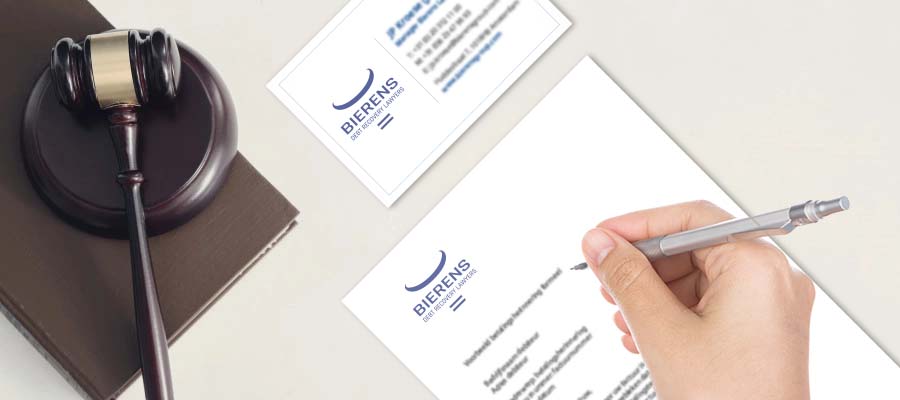Debt Collection Germany
Does your company have to deal with a debt collection case in Germany because a German customer does not pay your invoice? Our German debt collection specialists and lawyers will be happy to help you. We ensure that your outstanding invoice is paid quickly.
Read here what we can do for you if you want to engage a debt collection agency in Germany.

INTERNATIONAL DEBT COLLECTION IN GERMANY
When you do business with a German trading partner, you are confronted with business practices, customs, as well as rules and regulations that are very different from the ones you are used to. That makes debt recovery in Germany often complicated and time-consuming for you. Save your time and money by calling in one of our German specialists. They have the means to make your debtor pay.
|
Debt recovery in Germany
The Germans are among the best payers in Europe. Nevertheless, more than 16% of German debtors do not pay on time. Therefore, it is important to have a good credit management system for German customers, especially if you are not located in Germany.
After the first demand letter, it is usually already evident whether legal proceedings will be required. In Germany, amicable settlements are harder to reach to settle a conflict, and your German business partner will not hesitate to hire a lawyer. For a successful settlement of your case, it is therefore better not to go through a collection agency, and to seek the aid of a German debt collection lawyer instead.
What are the Benefits of collecting debts in Germany with Bierens?
- Effortlessly start your case within 2 minutes
- German-speaking debt collection lawyers
- Debt collection in Berlin, Hamburg or Munich? 95% success rate throughout Germany
- No Cure No Pay Fee debt collection
- Always only one point of contact
- 24/7 access to our online platform
German Lawyers in the United States: Meet our debt collection experts
The best way to collect your invoice in Germany is by seeking the help of one of our German Rechtsanwalt (lawyer), or our collection specialists. By doing that, you will not have to worry about anything, or even travel to Germany: our debt collection specialists will take care of everything.
They have extensive knowledge and experience with laws and regulations in Germany and speak German fluently. Therefore, they will be able to make your German debtor pay quickly.
|
DEBT COLLECTION PROCEDURE IN GERMANY
There are two phases that may be applicable for your debt collection process in Germany. In the extrajudicial phase, the debt is collected without the intervention of a judge. In the judicial phase, a judge intervenes to make your German customer pay. Since we are a law firm, we can assist you during both processes.
Extrajudicial phase in Germany
Here at Bierens, the debt collection procedure always starts with the prelegal phase (extrajudicial phase). During this phase, we try to avoid the intervention of a judge. To do so, we will personally contact your German debtor to ensure that your invoice is paid. During the extrajudicial phase in Germany, several options are possible:
1. Written demand letters and phone calls
We send the debtor a written demand letter and contact them by telephone, requesting that they pay your claim within a few days, together with interest and costs.
Tip: If you transfer your case before 4 p.m. on a business day, your debtor will receive a reminder the same day.
2. Announcing legal proceedings
The most powerful way to put pressure on your German customer is by announcing that you are going to start legal proceedings. Most companies want to avoid legal proceedings, so usually, this announcement convinces them to pay immediately. That is why it is advisable to promptly engage the service of a debt recovery lawyer, who can announce such proceedings on your behalf. This way, you prevent an unnecessarily protracted debt recovery process.
What if the debtor refuses to pay during the amicable phase?
If your debtor refuses to pay during the pre-legal phase, we can, in consultation with you, start legal proceedings. For this, we do a credit check and analyze the financial situation of your debtor. This allows us to better assess how your debtor is doing financially and whether legal proceedings make sense. When the claim is disputed, we also must start legal proceedings in most cases.
JUDICIAL DEBT COLLECTION
Do you want to start a judicial debt collection procedure against your German debtor? Then the first thing to know is: in which country should you litigate? In your own country or Germany? The answer will depend on the competent judge.
In your general terms and conditions, you can make agreements about the competent court in the event of a (payment) conflict. The clause in which this is stated is called the choice of forum.
Did you not make any agreement or are they not applicable? Then the main rule is that the court in the country of the defendant has jurisdiction. Which is, in this case, the German court. You must then go to Germany to follow legal proceedings there.
In addition, the main rule is that the law of the country of the seller or service provider applies. So, in this case, Dutch law is applicable. This means we will get a situation where the German court has to judge the case according to Dutch law. A legal system he is not familiar with.
No Cure No Pay Debt collection agency in the United States
During the extrajudicial phase, we work based on the No Win No Fee principle. If we do not collect, then you pay no legal fee. After all, an unpaid invoice causes enough frustration. We think it would be unfair if you were to be faced with all sorts of additional fees.
You only pay a fee if we can collect the entire claim. We try to recover this fee from the debtor as much as possible. For example, a successful collection case will cost you almost nothing! We call that justice, for you are getting exactly what you are entitled to. For a full overview, you can view our fees here


Debt collection laws in Germany
When taking legal action against a German customer, there are several German collection laws that we can rely on. The best collection procedure to use will differ depending on the situation. Of course, our lawyers will always look for the best option for you and your collection case.
The German legal system protects debtors. Therefore, it is harder to make a German debtor pay. However, our lawyers know perfectly which collection methods can and needs to be used to collect a debt in Germany.
The Mahnverfahren
The “Mahnverfahren” is an accelerated procedure for undisputed claims. It is characterized by its speed, simplicity and low cost. Within a relatively short period of time, you can obtain an enforcement order (“Vollstreckungsbescheid”); which orders the debtor to pay both your claim and the costs of the proceedings. Your debtor only has a few weeks to raise a legal objection.
If that does not happen, then the order for payment becomes legally binding and we can commence enforcement proceedings, such as a seizure of the debtor’s bank account or to send a bailiff to recover the debt.


The Klageverfahren
Is your claim disputed? In that case, it is better to start with an ordinary civil procedure. Both parties must substantiate their statement with supporting documents. After one or more court hearings, the judge will make a judgment. With this judgment we will be able, for example, to have the debtor's bank account seized. Before this judgment, a settlement is still possible.

International debt collection has never been easier with the help of our international debt collection law firm. We overcome any language, cultural and legislative barriers because we approach your debtor in their native language with our in-house specialists.
The best part is that we solve 95% of our cases without court intervention on a No Win No Fee basis. If your debtor fails to pay during this phase, then our efforts don’t stop just there. Our lawyers have the experience of local and international debt collection laws, which allows us to litigate on your behalf if necessary.
With Bierens by your side, no debtor can hide from us. You will not have to write off your debts or waste your time and money on a never-ending case. Find out what we can do for you below or contact us today for immediate action.
INTERNATIONAL COLLECTION LAWS
In addition to German collection laws, there are also a few European measures that can be used if your German customer refuses to pay.
It is important for the European Union that trade between European countries is stimulated. Therefore, complicated procedures are unwanted. That is why, in addition to the normal procedures, two alternative procedures can be used for foreign claims between two EU countries: the European Payment Order Procedure and the Small Claims Procedure.
Both procedures are relatively quick and inexpensive. To launch them, a standard form must be completed and sent to the competent court. If you and your trading partner have not previously agreed on the competent court in the event of a conflict, then it is usual for the judge in the defendant's country to have jurisdiction. Which is, in this case, the German court. The court then deals with the collection case and makes a judgment about it. The Small Claims Procedure is only suitable for small claims up to € 5,000. The European Payment Order only applies to undisputed claims.

LITIGATION IN YOUR OWN COUNTRY
Have you agreed in the general terms and conditions that the court in your country is competent? Then legal proceedings can be started in your country. Depending on your specific situation, our lawyers will look at what is most beneficial for your company. If we are going to litigate in your country against your German debtor, we can start ordinary civil proceedings. Both parties will be heard, after which the court will make a judgment.
ENFORCEMENT OF JUDGMENT IN GERMANY
When a judgment has been obtained, it must still be executed in Germany. Within the EU, it has been laid down that all judgments passed in a member state are also recognized in other EU countries. A specific form must be requested for the enforcement of a foreign EU judgment in Germany. This form has to be sent to the bailiff in Germany, together with the foreign EU court's judgment. The bailiff then ensures that the judgment is executed in Germany.
LIMITATION PERIOD IN GERMANY
Once the limitation period has been exceeded, an outstanding invoice expires. It is no longer possible to enforce its payment through the court. It is therefore important to keep a close eye on this prescription period. For business claims in Germany, the general limitation period is 3 years. This period starts at the end of the year in which the claim arose.
Exceptions to the limitation period
The limitation period of 3 years applies to normal claims. Bear in mind that the limitation period for some claims is different. For instance, claims related to transport law throughout Europe have a limitation period of 1 year. For their part, freight forwarders only have 9 months to file a claim, from the date the shipment is delivered.
Preventing your invoice from expiring in Germany
It is possible to prevent your invoice from expiring by interrupting the limitation period. The interruption stops the limitation period. In Germany, the limitation period can only be interrupted in one way, namely by starting legal proceedings


NATIONAL COVERAGE
Is your debtor located in Berlin, Cologne or Frankfurt? The location of your debtor does not matter. Our specialists can assist you throughout Germany. It is no longer necessary for you to seek the help of a debt collection agency or a lawyer based in Germany to successfully collect your case.
You can simply transfer your case to us online, and our German specialists will immediately start working on it. Thanks to our German department based in our head office in Amsterdam, as well as our own office in Düsseldorf, we can effectively collect your claims in Germany.
JUDICIAL DEBT COLLECTION IN GERMANY
For years, Bierens has helped many companies around the world with their debt collection cases in Germany. Thanks to our expertise, we have not only assisted foreign businesses but also German firms in their own country. We specialize in debt collection cases in various areas of law:
- Transport
- Buying and selling
- Construction
- Leasing and renting
- Agency agreement and distribution agreement
- Damages and unlawful acts
Start your debt collection in Germany today
Start your debt collection case in Germany today! While our German Desk get started on your case, you can resume your regular business operations. Upload your case for immediate action or contact our experts today.

Find out how we have helped others with debt collection in Germany
From simple debt collection cases to complex legal matters, from small businesses to multinationals across different industries, our specialists have assisted over 24.000 companies worldwide, including Germany. Find out how our German specialists and lawyers have helped other companies in a similar situation and find the solution for debt collection in Germany.












